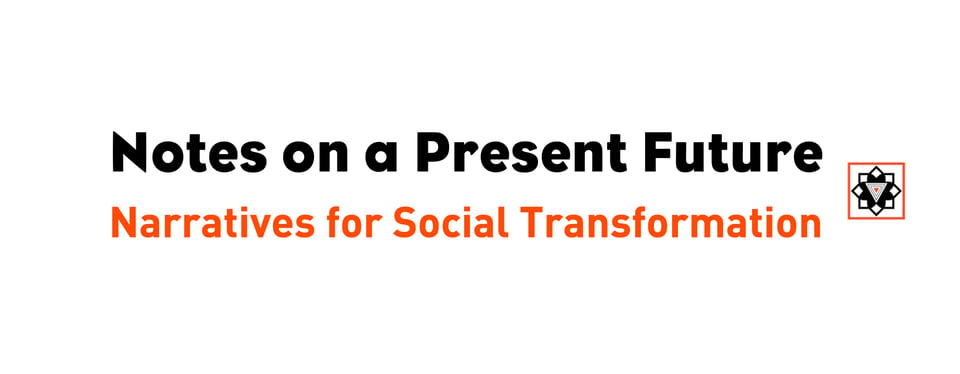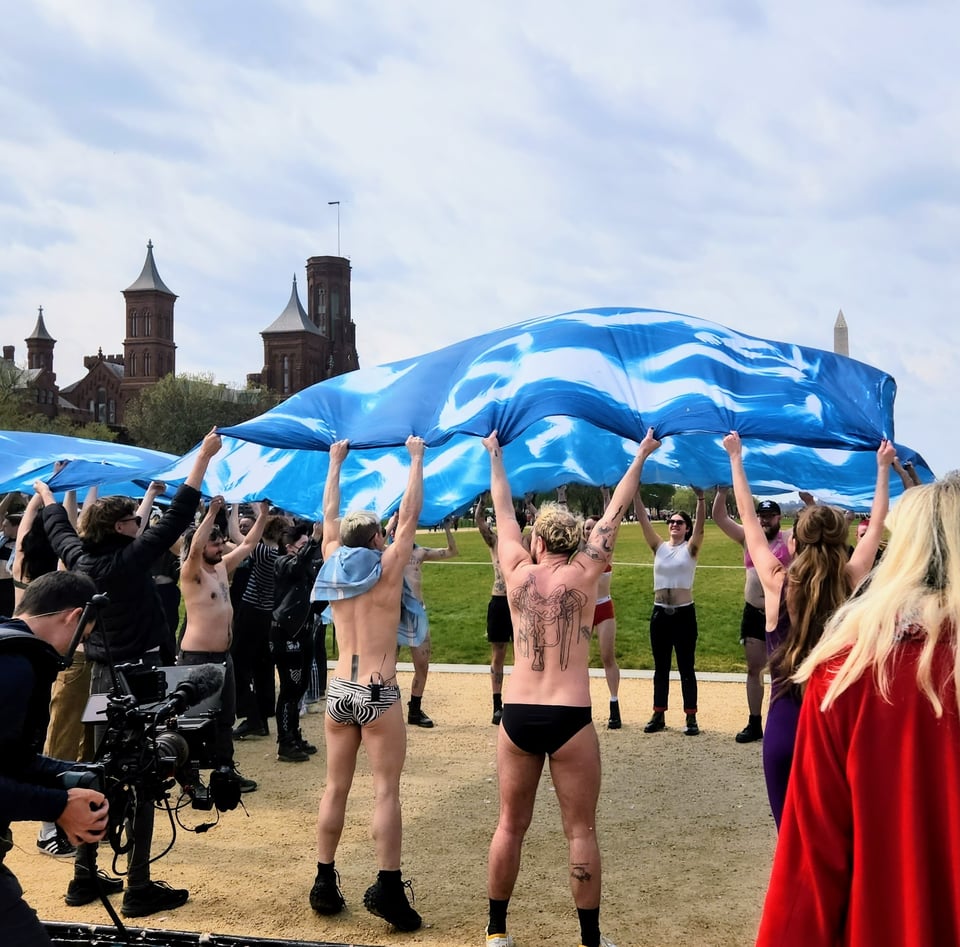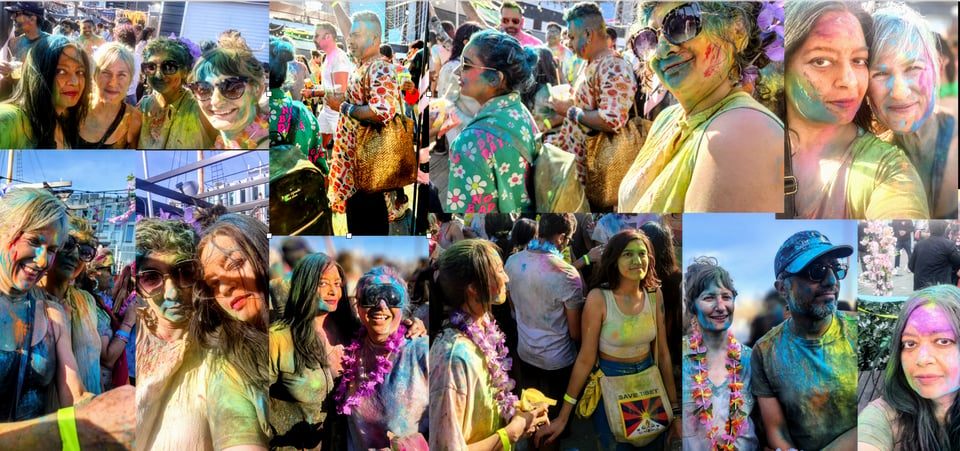The Shape of Liberation

Welcome back to Notes on a Present Future. If this is your first time here, this newsletter uplifts the stories and the work of people shaping the world to build just futures now.
What’s inside
1. A note from my desk
2. Updates (yours and mine)
3. Reading, watching, listening
4. Stay in touch
A note from my desk
Over the past decade or so, a few questions have anchored my creative advocacy practice, such as: How do we create hope in the midst of political and cultural despair, in the face of interconnected challenges of climate change, displacement, and inequality? Where can the work of social transformation lead us, and how do we get there? And what does liberation look like?
It can often be hard to see. But these past few weeks, I’ve participated in examples of liberatory art and gathering that are beautiful and necessary, especially in times of such violence.

On March 31, I went to the National Mall in DC for Etched in Light, a performance mounted by my friend and colleague Cassils for Transgender Day of Visibility. The project is connected to In Plain Sight, a larger project I’m involved with. (More on that in future newsletters). As a cis/straight person myself with all the privileges that conveys, it was an honor to be welcomed into the community of trans and queer persons, and to bear witness and show up as an ally to this community. The performance, which ends in the creation of a cyanotype of the dancers’ silhouetted bodies, was joyful, mournful, and beautiful in equal parts. As PJ Raval, the director of the In Plain Sight documentary, said, “The performance was a moving testament to presence, refusal, visibility, and spirituality, offering a moment of pure #transjoy, allyship, and the power of gathering, despite the challenges of the world.”

Two weeks later, I played Holi at Pier 17 on the East River, with DJ Rekha spinning their music. Rekha is a cultural pioneer who sculpts spaces of joy mixed with political resistance centering community vibrance, immigrant rights, Black liberation, Palestinian freedom, LGBTQ+ rights. They brought this spirit to this celebration of Holi, is a Hindu festival of new year, early spring, and renewal that to my knowledge was often celebrated syncretically. In the face of collapsing heterodoxy in India and escalating divisions here, there’s something beautiful about dancing bhangra and throwing powdered colors in Manhattan with Hindus, Muslims, Jews, Sikhs, Buddhists, Jains, Christians, atheists, agnostics who are Black, brown, white, straight, gay, monogamous, poly, asexual, trans, fluid, nonbinary, of all colors and politically across various spectrums – where none of those identities are called out explicitly, but rather woven together through dance. Truly a rainbow of colors in all senses of that (cliched, perhaps, but joyful) phrase.

Then this past week I dove into Weimar-inspired cabaret with Tiergarten by the theater company Death by Classical. There are eras in human history that mirror our current age, and the Weimar Republic is one that has transfixed me since I saw Alan Cumming play the emcee in Cabaret at Studio 54. (Second newsletter issue, second reference to Alan Cumming.) After Modi was elected the first time and Trump came down that escalator, I delved deeper into Weimar era art, starting with an exhibit at LACMA, exploring its explosion of art, film, literature, music, painting, and performance amidst political change from a post-World War I deposed monarchy to a faltering social-democratic government during the Great Depression, ultimately leading to the rise of fascism, antisemitism, xenophobia, and genocide. (Sound familiar?) When Kim David Smith came out in louche splendor as the emcee of Tiergarten, with all the artists channeling Weimar decadence and desperation, it reminded me of the imperative of hedonism as a political act.
Even though all these communities are different, even when the experiences are fleeting, what ties them together is their grounding in joy and movement. And that feeling lasts. It feeds our souls. It’s essential to liberation.
I was talking last week about all of this with Ingrid Lafleur, who said, “And the next question would be: Are we ready for liberation?”
Are we? You tell me.
Now, to updates…
Updates
There are quite a few updates this time. You all have been beautifully busy.(Also, I heard from some of you whose work was highlighted in the newsletter’s launch that others on this list contacted you to learn more. I’m using this space to amplify and hopefully connect you to each other, so I am thrilled about this.)
Mine:
New writing. In March, Stanford Social Innovation Review published Building Community Governance for AI, my piece encouraging civil society to address AI governance by promoting shared prosperity and distributed power through collective action from cooperatives and creative communities.
I began drafting this piece last fall, following a TechSalon event I moderated that focused on applying feminist frameworks to AI governance. Our discussion centered on existing power imbalances and harms in the tech sector, which underpin many of the arguments tech activists have made for years. These harms have only continued to grow. There is a critical need to address ethical AI governance and power dynamics, so through the Center for Transformational Change, I’ll be dedicating time to doing so.
If you or your organization are grappling with questions around ethics, power, and governance of AI and new technologies, please contact me (information below).
Project updates: I’m executive producer on a new short documentary! I’m very excited to be working with first-time director and Bitchitra Collective Fellow Zainab Sultan on Stand Up for Madinah. The film follows Madinah Wilson-Anton, the first female Muslim legislator in Delaware as she challenges the Biden administration on the ongoing war in Gaza and – when she is not confronting the establishment – as she spends time at comedy clubs trying her luck to find success as a local stand up comedian. We’re actively in production, so please contact me If you’re interested in supporting the film.
Yours:
Broadening the reach of afrofutures: Speaking of Ingrid Lafleur, she just launched the Afrofuture Strategies Institute, a global, virtual membership community based out of Johannesburg, SA. Explore if you’d like to expand your understanding of how afrofuture journeys can expand your and your communities’ worlds.
Reporting from the future: Changeist is launching a new workshop series for people in US media, focusing on reporting and understanding the future. The workshop, titled Futures for Journalists, provides tools for journalists to navigate the complexities of future narratives, and to help reporters, editors, and others in media sort through noise, stress-test claims, and craft more structured stories about the future. The first workshop is next month.
Generating new US narratives: Color Congress, led by Sonya Childress and Sahar Driver, issued a report last month, The People of Color Documentary Ecosystem: Engines for a New American Narrative, that tells the story of a POC documentary ecosystem in ascension and a media field in transition. The report outlines the last two years of behind-the-scenes work Color Congress members have done to reimagine and deepen what’s possible in the U.S. nonfiction film sector. This is essential work to build dominant narratives of justice and plurality. Take a look at the report and support the work.
Rwanda, 30 years later: KomezArt, a virtual art gallery founded during the COVID-19 pandemic and based in Kigali, released an online exhibit to commemorate Kwibuka 30 this month. The exhibit focuses not on the genocide itself but rather showcases artworks that chronicle a journey toward hope and endurance.
Feminism and African macroeconomics: Heavy section title, but the NAWI Collective makes the topic fun, dynamic, and accessible through a variety of media. The second season of their podcast dropped a few months ago. If you want a new lens on economic justice on the Continent, explore their site.
Machines that fail us: Journalist and researcher Philip Di Salvo partnered with the The Human Error Project to launch a new five-episode podcast series that deals with the issue of errors and biases in AI and algorithmic profiling, how different social groups make sense of these issues, and how we can imagine alternative futures.
Shifting the narrative of democracy: Aditi Juneja’s organization Project 2076 is working in partnership with Harmony Labs to deepen understanding of how mainstream media and entertainment creates stories around concepts of democracy and civic engagement.
SolidarityIs. It is indeed. Activist Deepa Iyer’s project with the Building Movement Project is providing support to social movements in the US through narrative, resources, and trainings on solidarity practice. They have a series called State of Solidarity (register here) and a rapid response ecosystem lab for those doing work on the frontlines (apply here).
Where Yemenis talk and the world (finally) listens: The New Humanitarian launched the Yemen Listening Project last month. The project aims to amplify the voices of Yemenis, too often overlooked, who share stories of hope and resilience amidst the devastating impacts of the country's ongoing nine-year conflict. Through this participatory journalism project, listeners understand how much war has changed for the more than 30 million Yemenis while most of the world looks away. The project not only sheds light on a largely ignored humanitarian crisis, but also works towards transforming the narrative by reminding us we need to listen.
New tools for film-based impact: The Unquiet Collective, co-founded by friend and colleague Alex Kelly, released a new, field-tested social impact toolkit. If you’re a documentary filmmaker and impact producer, take a look at the toolkit’s practical templates and how-tos.
Reading, Watching, Listening
Reading:
Doppelganger, by Naomi Klein. I read Klein’s book – about the distortions created by our digital worlds and how that might be breaking some of our brains – a few months after it came out, after the hype died down. And I loved it. I ended up rereading certain passages several times over. It’s much more personal than Klein’s other writing, but it’s still deeply political, drilling down into our global virtual culture, while at the same time questioning herself and her own (and the global left’s) orthodoxies. She delves into dark topics, but it’s still somehow a refreshing read, and it feels like an essential text for our era.
“Becoming Indian,” by Amitava Kumar. This short piece in Foreign Policy from the novelist and essayist Kumar captures the beating heart of the Indian diaspora who, during the current national election season in India, look from their sometimes distant vantage points of how India is evolving away from its post-colonial promise.
Machine Readable Me: The Hidden Ways Tech Shapes our Identities, by Zara Rahman. This is an excellent read by Zara on the nexus of and conflicts between digital identity and state surveillance. A quote from the book tells you why you should read it: “I believe that studying who a digital system doesn’t work for tells us much more about it than who it does, and I interrogate how power moves within a system, drawing from feminist critiques and feminist methods, motivated by wanting to change social systems writ large to be more equitable and fair.”
Systems Ultra: Making Sense of Technology in a Complex World, by Georgina Voss. I met George through a shared network when she came to New York City on her tour for this book, and relished my read of it. She treats this meaty topic with a touch of irreverence – it’s a fun book – while still treating it with the seriousness it deserves, and makes the question of systems accessible to lay readers. Take, for example, this quote: “Systems do not just happen. Those on show at CES may be constructed materially, but their comprehension is culturally reinforced. By the show’s end, feet aching, caffeinated into the sun, trapped in the swell of several thousand lanyarded attendees, and staring at what describes itself as a ‘Smart Door’, you may ask: truly, what the hell is going on?”
Watching:
A Letter of Apology from a Father to His Children: For Earth Day, Live Letters released this video of a reading by Benedict Cumberbatch. The reading is a short letter from Stuart Capstick, deputy director at the Centre for Climate Change & Social Transformations in Cardiff, Wales, to his children. It’s a beautiful, poignant, urgent reminder of what we are losing through inaction on climate change.
Savior Complex: A long time ago, Linda Raftee and I founded a community called Regarding Humanity to discuss ethical and effective narrative and design in the humanitarian sectors. We closed it down in 2018 to focus on other aspects of our own work, but the discussion is always timely. Enter this fantastic documentary series from Jackie Jesko and executive produced by Roger Ross Williams, which dials down on the colonialist, paternalistic thinking that surrounds so much aid work, especially in Africa from western workers.
A Revolution on Canvas: Another beautiful documentary, this one directed by Sara Nodjoumi and Till Schauder, that chronicles Sara's journey to recover her father's (Nikzad Nodjoumi) artworks from the Tehran Museum of Contemporary Art. The film weaves together Sara's family history, Iran's political backdrop, and the pursuit of the missing paintings, presenting an exploration of art and activism, as well as the personal stakes of both.
CDK Dance Company: I have watched this Dutch dance company’s gorgeous choreography and performance – that looks like Wes Anderson poured his palette on it – on repeat more times than I can remember. It has over 6 million views, so you’ve probably already seen it. But if you haven’t, go ahead and click. It will make you smile.
Listening:
Vibe Check: This podcast simply makes me happy. Hosted by Saeed Jones (one of my favorite contemporary poets), Sam Sanders, and Zach Stafford, the discussions open up new and varied ways of looking at our shared world, and new ways of constructing our shared culture. They span topics from Gaza to Silicon Valley, the Met Gala to the Superbowl, climate to love, with sharp insight, anger when needed, and humor. And, oh, the laughter.
Compassion: by Vijay Iyer, Linda May Han Oh, Tyshawn Sorey. Beautiful jazz album that’s a perfect salve in these days, especially to an end-of-day reverie.
See you again soon.
Happy Earth Day. Chag Sameach to those celebrating Passover. Strength to the students and faculty protesting on campuses across the U.S
In solidarity and joy,
Lina
To work with us: Center for Transformational Change
(We specialize in strategy, convening, and original production related to social transformation across displacement, climate justice, equity, and cultural engagement)
To book me for speaking: My Chartwell Speakers Profile
To learn more about my work: www.linasrivastava.com
To support this newsletter, please visit this link
To ask to amplify your social transformation project, please email here
To reach me on social media: LinkedIn, Twitter, Bluesky, Instagram, Mastodon
You are on this list as a member of my community. If you would like to change how you receive this newsletter: Update your preferences or Unsubscribe from this list below.
Copyright 2024, Lina Srivastava. All rights reserved.